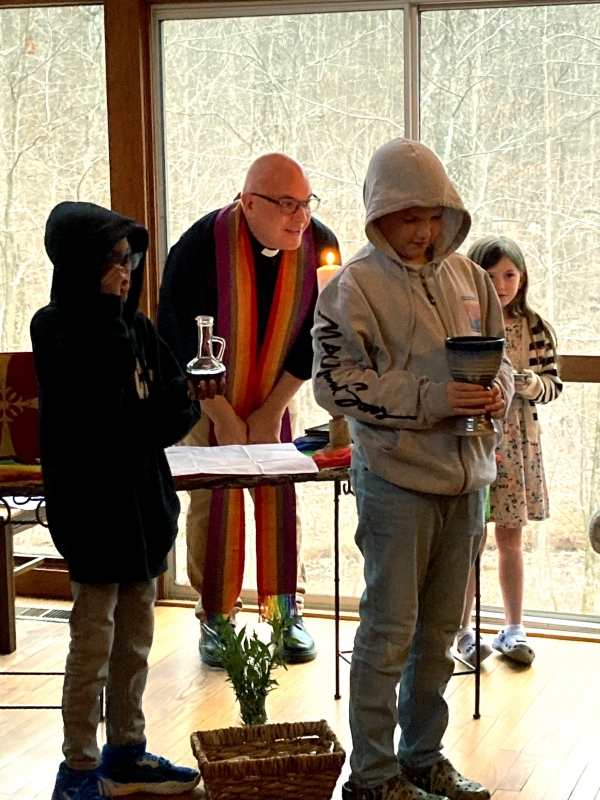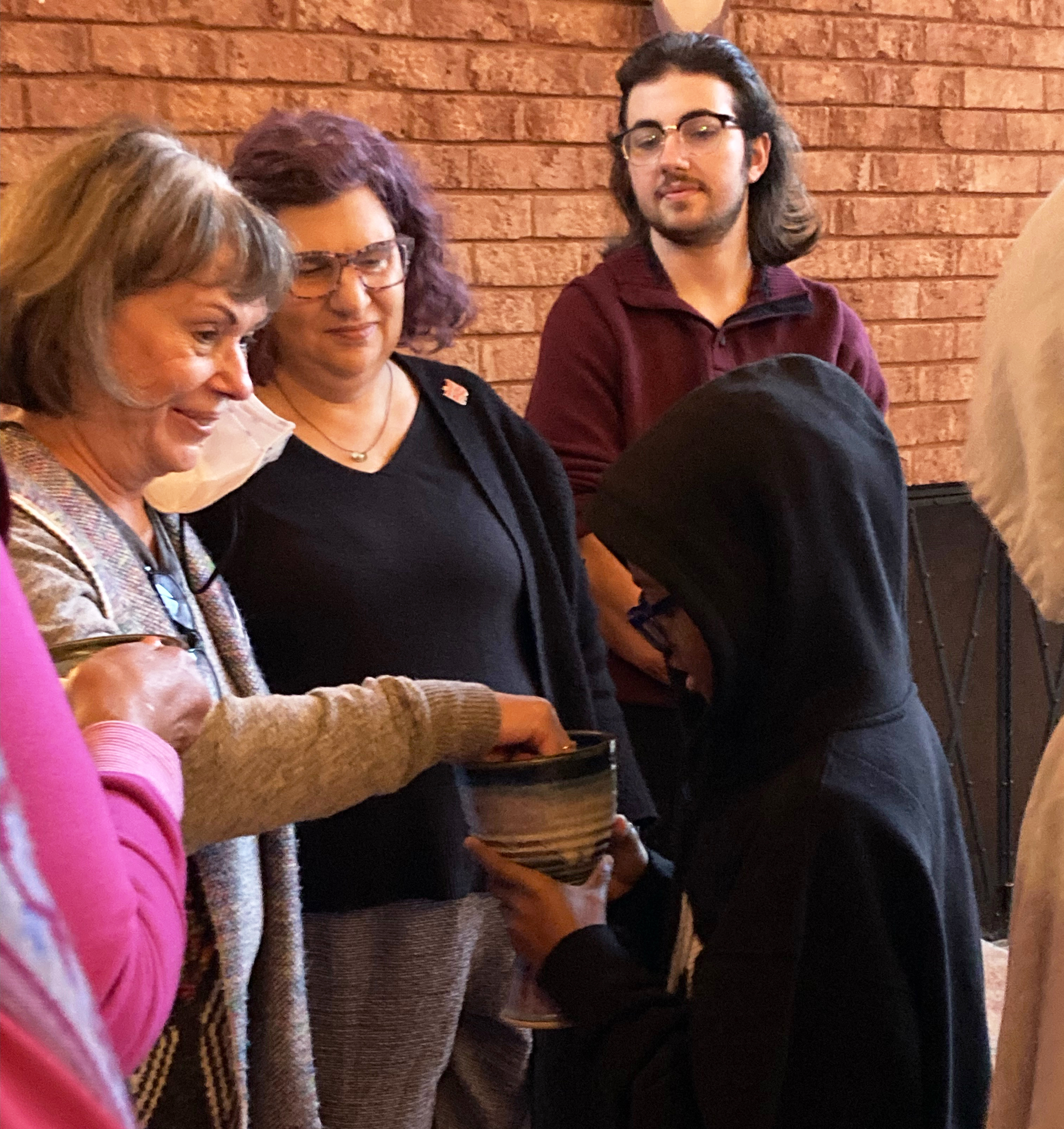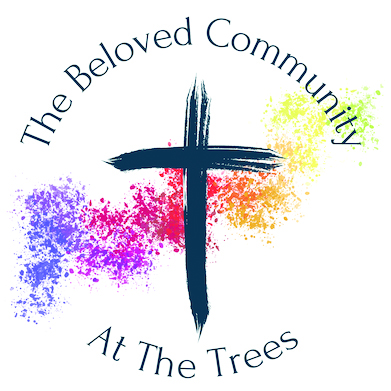Disciple: Creating a Brave Space for Worship

An interview with the Rev. Phillip Bass, one of the founding ministers of Beloved Community at The Trees
Interviewed on January 26 by Summerlee Walter
The Beloved Community at The Trees is a faith community rooted in Episcopal liturgy and practices, but without being “in a church.” Their mission is to create a community where those who seek healing, reconciliation, or simply a life of faith lived with intentionality among others can gather and worship together.
The community held its first gathering on February 15 and is averaging about two dozen worshipers so far. They held their first monthly “Clergy Worship & Wellness” service of healing for clergy on March 1.
[Image: The Rev. Phillip Bass is pictured in a rainbow stole during the opening worship service of The Beloved Community at The Trees. Photos throughout courtesy of The Beloved Community at The Trees]
Summerlee Walter How did the idea for The Beloved Community at The Trees come about? I understand that you are at Nativity, Raleigh, and they are the sending parish.
The Rev. Phillip Bass Yes, part of it came from Nativity. I started as an intern in 2020, so I’ve been with Nativity through ordination, through all of that, and as part of my time there, I’ve started bringing in more queer theory and queer theology and some psychology into my sermons. And the community itself has really been invested in reaching out to those on the margins. Before I got there, Nativity had done a lot of work—and still does—on reconciling issues of race. This was kind of a new thing for them, to really embrace sexuality and gender, so I’ve led several Queer 101 classes and those kinds of things. Out of that came an abundance of Nativity volunteers for something we tried called True Colors, a support group for queer youth in a safe place. And what we realized is the allies were present, queer folks in our parish were there, but people weren’t coming to the church.
Then in my clinical setting, one of the things that really kind of kicked this off for me is a workshop I lead, and I can get eight, 10 people on a Saturday morning, who pay for it. So we offered the same thing at Nativity as a gift to the community, as a ministry. And I had people tell me that they would rather pay than go into a church. Even though they knew I was teaching it, even though they knew I’m gay, right? To walk into a building was too triggering for them, for their trauma.
And so out of that, and then out of my clinical experience, and out of my personal experience, I started to think about how my own healing really took place in the community. I know God loves me. I have done historical research, done seminary. But it was really living day in, day out, among people who affirmed [those truths], that the healing took place. There was a study last year that said like 73% of Americans have a positive opinion of Jesus, but only 53% have a positive opinion of church. And 44% have a positive opinion of clergy. So if people don’t think they can find Jesus in the church, we’re going to take Jesus to them.
SW In a nutshell, how would you describe the mission of The Beloved Community at The Trees?
PB I think the mission is really to be—for anyone who has experienced religious trauma but still wants to explore their life of faith or get to know what the church is about—a brave place to ask the questions. Even in the offertory, there will be a basket where people can drop donations, but everyone will get a card when they enter, and the real donation is your prayers and your questions you write on the card. And some of those questions will become part of the lectionary discussion because there’s not going to be preaching; there’s going to be discussion. Following the Eucharist, we’re going to switch over into a simple meal of bread and soup each Sunday, and those questions may spill over into that conversation, too.
So there’s this idea that whatever someone’s bringing is their gift to the community, and using that as a way of affirmation to help with trauma processing is the big mission. I think it especially will include queer folks and people of color and women, people who have felt excluded from the power structures of the church. In my practice, I see a lot of folks who have done the deconstruction work and don’t know what to do now, how to put things back together. So that’s part of this, too, reaching out to all those people who have somehow been distanced from Jesus.
SW How does your clinical work inform your approach to worship and the community?
PB In my clinical work, the main areas I focus on are LGBTQIA issues and relationships. In the last five or six years, I’ve really moved a lot more into relationship therapy: families, couples. And I do a lot of trauma work.
I think where this spills over is really bringing in some of the relational work: Here’s how we have healthy boundaries, and this is how we actually communicate, and we don’t triangulate. Those kinds of behaviors that trauma produce in community, we can work those out. How do we do this together? I also recognize some of the trauma triggers and the importance of community in trauma healing, the importance of sitting down and sharing a meal.
SW Your first Sunday is in mid-February, right?
PB February 18. Starting with Lent, that’s going to be our kickoff.
I obviously will be there in the priest role, but I really want the community to be as empowered as they can be. There are so many ways to volunteer. We even have a volunteer role to walk people back to their cars with flashlights after dark because it’s out at The Trees.
During the first offertory, we have an 11-year-old who’s going to play her guitar for us. Everyone’s bringing their talents—or even just their worry, that’s part of what they have to give, too.
 SW Is participating in reclaiming the liturgy part of what helps people overcome their trauma?
SW Is participating in reclaiming the liturgy part of what helps people overcome their trauma?
PB Very much so, that’s part of it. We’re making space for people, so if they just need to sit quietly, they can, or if they really want to get engaged, they can. Whatever someone’s bringing is welcome. One of the people on the discernment team is the Rev. Dan Laird [now the deacon for The Beloved Community at The Trees]. Dan will be present for each gathering as a prayer companion. So if someone needs to step away and go say something, or they just need prayer time, there’s a separate room they can go to, and Dan’s going to be identified as the person they can signal if they want him to go with them.
We’re also thinking that this may not be a community where people stay forever. This is a healing space, and then maybe they’re ready to go back into a traditional church setting. I hope to have a team in place who will go visit parishes with them until they find one. It’s part of the healing journey, and we’re here for it, to support people any way we can.
[Image: Communion during the opening worship at The Beloved Community at The Trees.]
SW How are you building community as the ministry launches?
PB Word of mouth has been big. It’s actually bigger than I thought it was going to be. We were kind of worried that we may not have the space the first Sunday because the space doesn’t hold that many people.
Social media is starting to put us out there. I’ve been meeting with other priests who are putting it in their newsletters and those kinds of things. Every Thursday in February, I’m going to be hanging out for a couple hours at the Starbucks on Guess Road, which is the closest route, and I’ve posted that online. If you have questions, if you want to help form community, come hang out with me. Jeremy Clos, who is the lay associate for Christian formation at Nativity, is going to come with me because he’ll be helping with formation.
SW You mentioned being concerned that the space won’t hold everyone. What is the capacity of the space, currently?
PB In one circle, it’ll hold 16 to 20. In two circles, I think we may be standing some. You get a large interest at the beginning, then it will kind of shrink and then grow again. We are so grateful that St. Philip’s has donated the space to us to use at no charge. That’s an amazing gift. Part of the vision of this ministry is that we don’t own a building, that we don’t get tied up in that part of church life, so wherever we are, for now, is our space. We love it. I mean, St. Philip’s at The Trees is a beautiful place if you haven’t been, but if we sometime need to outgrow it or St. Philip’s needs it, we will ask around and see who else has space for us.
The whole idea is that we will be looking at each other. We’ll be sitting around in a circle. We’ll be really engaged, and kids will be playing in the middle. I’m planning to have a cart with books for people who are new to The Episcopal Church or just want a refresh, and on the side of the cart will be Play-Doh and coloring books, so kids can play in the service. That’s a big part of the vision, as well.
SW Looking to the future, what is your vision for the community as it grows?
PB That is the hardest question, right? One of the things that I’ve been struggling with and that I talk about with the discernment team is that it’s hard to answer that question without “the church” in mind, without thinking we’ll have a building, or we’ll have this many people. This ministry is really not focused on any of that. I don’t think the number of people will speak to the mission as much as everyone getting what they need from it. And so I hope that in two years it is well-established as a community where people can heal, where they can come and remember that Jesus loves them. They can experience that love among other people in community and feel empowered to take on some role in the church as well. That really is what I hope for two years down the road.
Since the mission of this community is to reach out to those people who have been hurt by the church, we’re not calling it church, we’re not calling it worship services; we’re calling it gatherings. And part of this, if I’m honest, is also an exploration of what the new church is going to look like. Trying it out and going with the Spirit’s urging that was waking me up at 3 a.m. for months on end. I really appreciate Bishop Rodman for his guidance in discernment. He affirmed that this was the stirring of the Spirit.
 SW You mentioned that you’re not calling it church, so will the service follow the basic Episcopal liturgy?
SW You mentioned that you’re not calling it church, so will the service follow the basic Episcopal liturgy?
PB Yes, it is still an Episcopal service. We’re following more out of Enriching our Worship, so more inclusive language. The difference is instead of a sermon, instead of me saying here’s what I want you to believe about God, there’s a series of questions that will be asked every week. We’ll read the scripture, and then the discussion will be around what did you learn about God, what did you learn about love, what did you learn about community, and what you learn about yourself? Then there will be a fifth question that is particular to that week. Those core four, we want to get them into the DNA [of the service], that this is what we get when we get into scripture. We learn it from each other; we don’t learn it just from one person.
The rest will look like the Eucharist. All of the Eucharist is there. I have someone who has offered to bake gluten-free bread for us. I think I will probably serve the first person, but then I think it will be passed.
SW Was there anything else you want us to know about this ministry as it gets off the ground?
PB I think we’re going to learn as we go. And who knows what it’ll actually look like in three weeks when it happens. We have a vision, but I’m sure it will change as we learn.
LEARN MORE
The discernment team of the Rev. Phillip Bass, the Rev. Helen Svoboda-Barber, the Rev. Dan Laird, the Rev. Stephanie Yancy, the Rev. Nathan Kirkpatrick, the Rev. Marianne Younger, Henry Kennelly and Elizabeth Newman invite you to worship with them at The Beloved Community at The Trees, a ministry of Nativity, Raleigh, hosted at St. Philip’s in The Trees in Durham. Learn more at belovedcommunitydurham.org.
The Rev. Phillip Bass is one of the founding ministers of The Beloved Community at The Trees, the associate rector at Nativity, Raleigh, and a licensed clinical mental health counselor.
Tags: North Carolina Disciple
